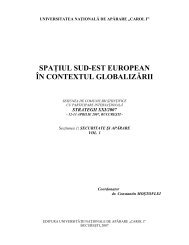PROVOCĂRI LA ADRESA SECURITĂŢII ŞI STRATEGIEI LA ÎNCEPUTUL SECOLULUI XXI
provocări la adresa securităţii şi strategiei la începutul secolului xxi
provocări la adresa securităţii şi strategiei la începutul secolului xxi
Create successful ePaper yourself
Turn your PDF publications into a flip-book with our unique Google optimized e-Paper software.
- to reaffirm the European perspective of the countries of the<br />
Western Balkans in the Stabilization and Association Process.<br />
- to enforce relations with the Southern Mediterranean countries<br />
to be based on a long term approach promoting reform,<br />
sustainable development and trade<br />
The EU’s external borders will not become new dividing lines but<br />
the focus of enhanced co-operation [1].<br />
The accession of the new member states will strengthen the<br />
Union’s interest in enhancing relations with the new neighbours. Over the<br />
coming decade and beyond, the Union’s capacity to provide security,<br />
stability and sustainable development to its citizens will no longer be<br />
distinguishable from its interest in close cooperation with the neighbours<br />
[2].<br />
Interdependence – political and economic – with the Union’s<br />
neighbourhood is already a reality. The emergence of the euro as a<br />
significant international currency has created new opportunities for<br />
intensified economic relations. Closer geographical proximity means the<br />
enlarged EU and the new neighbourhood will have an equal stake in<br />
furthering efforts to promote trans-national flows of trade and investment as<br />
well as even more important shared interests in working together to tackle<br />
transboundary threats - from terrorism to air-borne pollution. The<br />
neighbouring countries are the EU’s essential partners: to increase our<br />
mutual production, economic growth and external trade, to create an<br />
enlarged area of political stability and functioning rule of law, and to foster<br />
the mutual exchange of human capital, ideas, knowledge and culture.<br />
General Affairs and External Relations Council [3] (GAERC)<br />
launched the work, noting in particular the situation of Ukraine, Moldova<br />
and Belarus – new neighbours on the Union’s land border.<br />
The Commission prepared a Communication exposing the concept.<br />
This approach was broadly endorsed by the Council and by our Heads of<br />
state and government. Later, it was presented another Communication on<br />
cross-border-co-operation at the enlarged Union’s external borders and on<br />
the establishment of a new neighbourhood financial instrument. Recently,<br />
the Commission tabled proposals for new regulations aiming at facilitating<br />
local border traffic. The establishment of a special ‘local’ visa regime is<br />
envisaged. Preparation of the Action Plans has already started. Within the<br />
Commission was taken some measures to better organize the work on Wider<br />
Europe.<br />
European Council [4] confirmed that the Union should take the<br />
opportunity offered by enlargement to enhance relations with its neighbours<br />
on the basis of shared values [5]. The European Council welcomes the<br />
Commission's proposals for a European Neighbourhood Policy (ENP). The<br />
European Council reiterates the importance it attaches to strengthening cooperation<br />
with these neighbours, on the basis of partnership and joint<br />
ownership and building on shared values of democracy and respect for<br />
human rights [6]. Work on its implementation is already under way. The<br />
European Council in Brussels welcomed progress made on the Wider<br />
Europe-New Neighbourhood Initiative. It urged the Council and the<br />
Commission to take forward work in implementing this initiative with a<br />
view to ensuring a comprehensive, balanced and proportionate approach.<br />
This would include the establishment of a financial instrument, responding<br />
to the needs to promote cross-border and regional/ transnational cooperation<br />
on the external borders of the enlarged Union.<br />
Enlargement gives new impetus to the effort of drawing closer to<br />
the 385 million inhabitants of the countries who will find themselves on the<br />
external land and sea border, namely Russia, the Western NIS and the<br />
Southern Mediterranean.<br />
The European Neighbourhood Policy sets ambitious objectives for<br />
partnership with neighbouring countries based on strong commitments to<br />
shared values and political, economic and institutional reforms. Partner<br />
countries are invited to enter into closer political, economic and cultural<br />
relations with the EU, to enhance cross border cooperation and to share<br />
responsibility in conflict prevention and resolution. The Union offers the<br />
prospect of a stake in its Internal Market and of further economic<br />
integration.<br />
The speed and intensity of this process will depend on the will and<br />
capability of each partner country to engage in this broad agenda. The policy<br />
builds upon and reinforces the existing framework of co-operation.<br />
As far as the bilateral dimension of EU relations is concerned on<br />
the two basic frameworks: Association Agreements or Partnership and<br />
Cooperation agreements, including political dialogue. The most important<br />
difference is that, in the Mediterranean, an explicit regional dimension<br />
encouraging the development of intra-regional initiatives and cooperation in<br />
a broad range of sectors is included.<br />
This policy of promoting intra-regional cooperation consists of<br />
three Chapters defined in the Barcelona Declaration supplementing the<br />
bilateral framework: the Political and Security Chapter, Economic and<br />
Financial Chapter and Social, Cultural and Human Chapter.<br />
The Partnership and Cooperation Agreements (PCAs) in force with<br />
Russia, Ukraine and Moldova grant neither preferential treatment for trade,<br />
nor a timetable for regulatory approximation. Given the different starting<br />
points and objectives it is clear that a new EU approach cannot be a one-<br />
303<br />
304



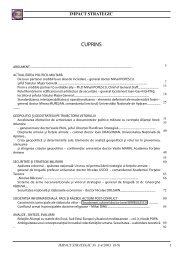

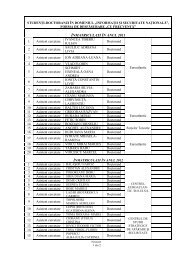
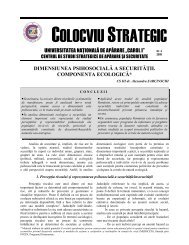
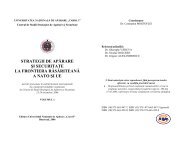
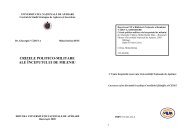
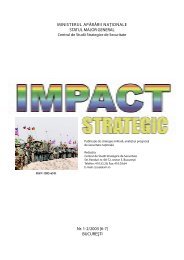


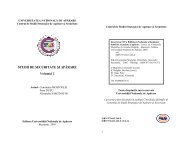
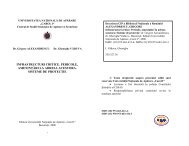


![„CAROL Nr 4 [29]/2008](https://img.yumpu.com/53801719/1/184x260/carol-nr-4-29-2008.jpg?quality=85)
